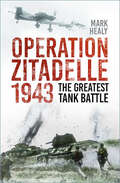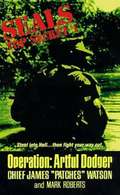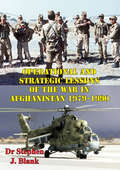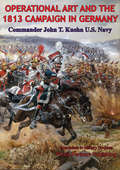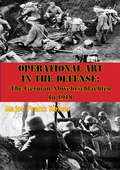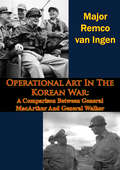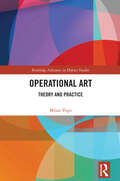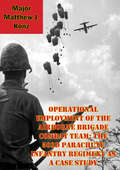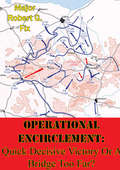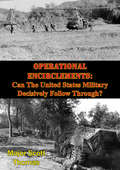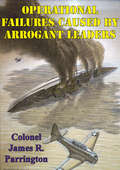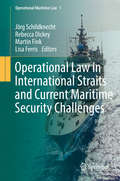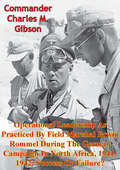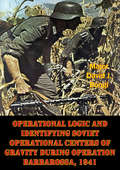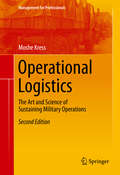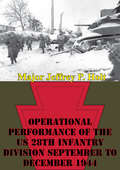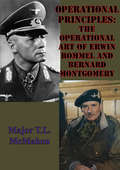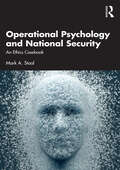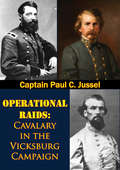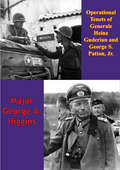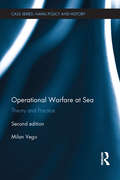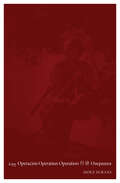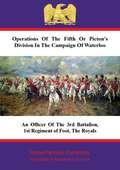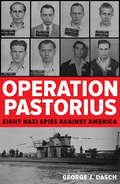- Table View
- List View
Operation Zitadelle 1943: The Greatest Tank Battle
by Mark HealyIn July 1943, Hitler launched Operation Zitadelle, the last German offensive on the Eastern Front. It was an attempt to shorten the German lines by eliminating the Kursk salient and was designed to result in the encirclement of the Red Army. In reality, the German tanks came up against impenetrable Russian defences: minefields, artillery and anti-tank emplacements, spread through lines 250km deep and manned by Russian troops whose actions often verged on the suicidal. The greatest tank battle in history, Operation Zitadelle assured the Nazis’ defeat and was ‘the swan song of the German tank arm’.Involving over 9,000 tanks, 5,000 aircraft, 35,000 guns and mortars, 2.7 million troops and 230,000 casualties, the Battle of Kursk’s scale and barbarity eclipsed all other clashes in Europe. In this book, historian Mark Healy gives a clear, concise account of those dramatic days in 1943.
Operation: Artful Dodger (Seals - Top Secret, Book #1)
by James Watson Mark RobertsThe CIA has discovered that an American-made nuclear weapon, lost at sea, has been recovered and restored by the Soviet Union, who is planning to detonate it somewhere in North Vietnam in an attempt to end the U.S.'s involvement in the Vietnam war. The CIA calls on Alpha Squad, First Platoon, SEAL Team 2 to infiltrate the north and either recover or destroy the weapon before it can be used. But the mission will be far tougher than anything the SEALS have ever faced. Violence. 1st novel in the "SEALS--Top Secret" series, 1998. Avon Books
Operational And Strategic Lessons Of The War In Afghanistan, 1979-1990
by Dr Stephen J. BlankThe Soviet invasion of Afghanistan at the end of 1979 was, in many respects, a milestone in Soviet history. On the one hand it represented the high-water mark of Soviet intervention in Third World states and thus served as the archetypical example and justification for the intensification of the cold war in the early 1980s. On the other hand, the ultimate defeat and poor performance by this military in Afghanistan was one of the key forces that triggered the drive for a comprehensive reform of the entire Soviet national security system and its decision-making structures. Thus this war had profound domestic and foreign repercussions.This analysis focuses on the purely operational and strategic lessons of the war. It insists that lessons of these kinds were present and that they offer significant insights both for such wars in general and for the course of Soviet military developments in the 1980s and 1990s. These lessons also offer important clues concerning the reforms required in order to preserve democratic civilian control over the military. It should also alert analysts everywhere as to the nature of local wars in the Third World in the 1990s, a phenomenon that shows little sign of abating. Though in many ways like all wars, this war was unique; it was not merely a series of random tactical exercises that were ultimately futile. Rather, like all wars, it shows us something of the shape of our present and future, if we are only insightful enough to understand it correctly.
Operational Art And The 1813 Campaign In Germany
by Commander John T. KuehnThe purpose of this monograph is to search for, identify, and discuss the emergence of elements of operational art during the Napoleonic wars. James Schneider has tied the emergence of operational art to the technological advances of the industrial revolution; specifically the rifled musket, steam locomotive, and instantaneous communications theoretically possible with telegraph. Schneider lists eight "key attributes" that are used in this monograph as elements of operational art. These elements are: a distributed operation, distributed campaign, continuous logistics, instantaneous command and control, operationally durable formations, operational vision, a distributed enemy, and distributed deployment...This monograph uses Schneider's elements as the criteria to establish the presence or absence of operational art in the 1813 campaign in Germany.The 1813 German campaign is examined from the viewpoint of Napoleon's adversaries; principally the Prussians, Russians, and Austrians. This campaign was used because it represents Napoleonic warfare at a very high level of sophistication by both the Allies and their French opponents. Both sides were now organized along the French model with field armies, corps, and divisions as standard organizations. The armies that faced each other, while composed of some veteran troops, were mostly the result of massive conscription across all classes of society. All of the protagonists were essentially nations in arms. The complexity of this campaign, there were approximately seven field armies in Germany by the fall of 1813, lends itself well to a search for Schneider's elements. The course of this campaign followed a pattern of attrition and exhaustion which, too, favors an operational analysis vice analysis along the lines of classical strategy.
Operational Art In The Defense: The German Abwehrschlachten In 1918
by Major Frank ReiserThe stalemate in World War I created the need for a solution to escape this resource intense form of warfare. Following five unsuccessful German offenses in early 1918, the Germans found themselves in a solely defensive scenario conducting defensive battles, named "Abwehrschlachten."Based on the findings of previous research on these offensives, the monograph analyzes German operational thinking and the display of operational art in the subsequent defensive scenario from the last unsuccessful offensive in July 1918 to the armistice in November 1918.The paper relies on two approaches. First, it analyzes data from primary sources to identify changes in the strategic context from a German perspective, by using a model from Collin S. Gray, and derives implications for the German ability to apply operational art. Second, it reflects German military actions during the "Abwehrschlachten" upon a framework of operational elements, derived from the previous case study of David T. Zabecki on the German offensives.The analysis results in a confirmation of previous findings about the level of German operational thinking at that time, but also depicts the limitations the Germans faced in their attempts to apply their thinking through military action. Those limitations predominately emerged from significant changes in the operational environment in 1918. Current consensus, in line with Clausewitz's thoughts on the defense, is that the defense, tied to a negative aim, is a temporary form of warfare and military leaders always strive to seize the initiative to transit to the offensive form of war-fighting, tied to a positive aim. Based on the analysis of this solely defensive scenario from a German perspective, the monograph questions the applicability of today's understanding of operational art in such a purely defensive scenario and suggest the evolution towards a framework for operational art in the defense.
Operational Art In The Korean War: A Comparison Between General MacArthur And General Walker
by Major Remco van IngenThis monograph addresses operational art during a specific period of the Korean War. Both General Walton Walker and General Douglas MacArthur developed operational approaches to unify Korea when the decision was made to cross the 38th parallel into North Korea. General MacArthur's approach used two major ground commands, was more daring, but more complicated. General Walker, on the other hand suggested an approach under one unified ground commander, seemed more methodical, and less daring. Ultimately, General MacArthur's approach was the one executed. The X Corps amphibious assault did not bring the anticipated result. The out loading of X Corps, in preparation for the assault took longer than anticipated and the enemy had mined the sea approaches to Wonsan. These two factors combined with an unsynchronized ground attack by I ROK Corps eliminated the chance of a successful envelopment.The monograph provides insight in the relationship between the commander's personality, his previous operational experiences, and his preference for a particular type of operational approach.
Operational Art: Theory and Practice (Routledge Advances in Defence Studies)
by Milan VegoThis book describes and explains the theory of operational art – an intermediate field of theory and practice between tactics and strategy.This book is one of relatively few works in the English language on the theory of operational art. It deals predominantly with the theory of operational art as applied to preparing, planning and conducting a high-intensity conventional war. In contrast to other works, the book is written in broad terms, rather than focusing on national military culture and experience, which allows more flexibility in adjusting to new evidence. The book explains the theory of operational art in all three physical dimensions (land, sea, and air/space) and describes/analyses various aspects of operational art in general terms, using historical examples to facilitate the understanding of the theory. The case studies focus on examples of major campaigns and operations in both the more recent and distant history of warfare, including the current Ukraine–Russia war.This book will be of much interest to students of strategic studies, military history, defense studies, and International Relations, as well as military professionals.
Operational Employment Of The Airborne Brigade Combat Team: The 503d Parachute Infantry Regiment As A Case Study
by Major Matthew J. KonzGiven the focus on the Brigade Combat Team as the Army's primary combat unit, the limited availability of U.S. Air Force airlift assets, and the U.S. Army history of employing predominantly medium sized airborne units, future airborne operations in support of operational level objectives will likely center around the Airborne Brigade Combat Team (ABCT). The combat airborne operations of the 503d Parachute Infantry Regiment will provide a case study to assess the elements of risk, surprise and the operational context of how the airborne unit contributed to the achievement the operational and strategic outcomes. The combat airborne operations discussed are the jump to re-take the island of Corregidor in the Philippines in February 1945, Operation Junction City in February 1967, and the airborne insertion of the 173d Airborne Brigade onto the Bashur airfield in Northern Iraq in March 2003. The intent of this monograph is to provide insights into the possible employment of the current ABCT and how to best use the resources and organization that we have, not necessarily to advocate a radically new airborne organization, propose new equipment, or recommend a new mission for airborne forces.
Operational Encirclement: Quick Decisive Victory Or A Bridge Too Far?
by Major Robert G. FixHistory is replete with examples of lost opportunities to decisively defeat an enemy's army on the field of battle. All too often, tactical success has not been followed by actions to ensure operational success. This failure may be attributable to a misunderstanding of the dynamics of operational encirclement. Two case studies highlight these dynamics. The Battles of the Falaise Gap in 1944 and the Ruhr Pocket in 1945 both illustrate the difficulties operational commanders face in conducting this type of operation. In the first case, Allied commanders failed to anticipate the opportunities presented by poor operational planning and tactical execution by their German adversaries and missed an opportunity for a quick and decisive victory. In the second, Allied commanders succeeded in learning from their previous mistakes at Falaise to achieve decisive operational results during the encirclement of the Ruhr.This monograph examines the dynamics of operational encirclement and determines what critical factors impact success or failure in achieving decisive results. It concludes that the three most critical factors which directly impact the success or failure of an operational encirclement include: the development of a flexible campaign plan, the establishment of an efficient and effective command and control infrastructure, and an ability to properly read the events on the battlefield. Based on these factors several planning considerations are identified as useful in the planning and execution of operational encirclements.
Operational Encirclements: Can The United States Military Decisively Follow Through?
by Major Scott ThomasThis study is a historical analysis of how encirclement operations have been and still are important offensive operations. These operations need to be given priority in planning and execution by the United States Military. Encirclement operations have proven to be decisive military operations throughout history; regardless of the composition and disposition of the enemy encircled. The U.S. military has maintained the decisive edge on the battlefield for over sixty years. Even with the benefits of technology, air supremacy, firepower, mobility, and maneuver, the U.S. military has not yet been completely successful in planning and executing encirclement operations. Today the U.S. military is arguably the best equipped and trained force in history. Even with this professional force, it is questionable whether the U.S. military could successfully execute an encirclement operation. Therefore this monograph provides a historical examination as to why the U.S. military has been unable to reap the benefits of the offensive maneuver of encirclement.To accomplish this examination, this monograph conducts an analysis of four historical case studies: The Argentan-Falaise Pocket, the Battle of Ia Drang, Doctrinal Revolution from 1986-2001, and Operation Anaconda. The analysis identifies the U.S. military has placed an over reliance on firepower to replace the maneuver of ground combat units. Secondly, this monograph also argues the U.S. military has placed too much emphasis on technology. This belief in technology has reduced the number of ground combat units employed in offensive operations. Additionally, U.S. military doctrine historically has not provided the foundation necessary to support and encourage the planning and execution of encirclement operations. These deficiencies together have prevented the U.S. military from capitalizing on the decisive nature resulting from the speed and shock of correctly executed encirclement operations.
Operational Failures Caused By Arrogant Leaders
by Colonel James R. Parrington USMCThe Japanese defeat at Midway and the U.S. occupational failure in Iraq resulted from operational blindness on the part of arrogant strategic leaders. The failures of the Japanese and U.S. militaries directly resulted from the professional arrogance exhibited by Admiral Yamamoto and Secretary Rumsfeld as they deliberately limited the scope of their strategic thinking to how their own forces would be employed, exclusive of the combat potential available to their enemy. Admiral Yamamoto and Secretary Rumsfeld insisted on complete control and created environments where their highly capable and informed subordinates were either isolated from the decision-making process or not included at all. They were similarly contemptuous of their foe and uncritical of their own capabilities. Admiral Yamamoto and Secretary Rumsfeld made the mistake of confusing great power with unlimited power, failed to recognize that their positions were subordinate to a greater goal, and ultimately lost perspective on the limits of their power.
Operational Law in International Straits and Current Maritime Security Challenges (Operational Maritime Law Ser. #1)
by Jörg Schildknecht Rebecca Dickey Martin Fink Lisa FerrisThis book addresses a wide range of contemporary operational maritime law issues across the spectrum of operations. It provides sophisticated analyses and insights, and offers new interpretations of topics that are directly relevant for contemporary naval operations.The book examines unresolved legal issues in order to provide guidelines for conducting maritime operations, and also offers reference material for general education on the law of naval operations. Further, it serves as a comprehensive resource for operational doctrine and military planning, and presents an approach to dealing with multiple legal issues that demonstrates how modern military operations at sea can legally be executed. Focusing on operational and tactical topics, it is a valuable addition to the bookshelves of military lawyers and operators alike.
Operational Leadership As Practiced By Field Marshal Erwin Rommel During The German Campaign In North Africa, 1941-1942: : Success Or Failure?
by Commander Charles M. GibsonThe Germans entered the North African theater to alleviate pressure on the Italians and prevent the collapse of the Italian Fascist regime. Rommel arrived in North Africa, and despite orders to establish a blocking force, immediately went on the offensive with the objective of forcing the Allies out of North Africa. After two years of fighting, Rommel and his forces were defeated.This paper analyzes the operational leadership of Field Marshal Erwin Rommel during the North African campaign of 1941-1942. It concludes that Rommel, despite being an accomplished tactical leader, was a poor operational leader. Rommel lacked the proper personality, military education, and military experience to obtain the broad view necessary to become a successful operational leader. His personal relationship with Hitler put Rommel in a position of authority he was not qualified to fulfill. Additionally, his inability as an operational commander to fully comprehend logistics and strategic objectives resulted in the German's defeat in North Africa.The Joint Force Commander must ensure his operational commanders are more than just tacticians. A successful tactical leader will not automatically become a successful operational leader. Close scrutiny of potential operational commanders is a must to ensure the future leaders of the U.S. military will be able to accomplish military strategic and operational objectives.
Operational Logic And Identifying Soviet Operational Centers Of Gravity During Operation Barbarossa, 1941
by Major David J. BongiThis monograph examines Soviet operational centers of gravity during Operation Barbarossa, the German invasion of the Soviet Union in 1941. Specifically, the examination focuses in two areas: (1) German planning for Operation Barbarossa; (2) the operational objectives selected for the second phase of the campaign.The second phase was selected because it was during this phase that the focus of the German military effort became diverse. Two competing strategies within the German political and military command structure caused this. While political-ideological and economic factors influenced one, purely military concerns influenced the other. In the end, the Germans diluted combat power in phase two towards three operational objectives: Moscow, Leningrad, and the Ukraine.Thus, the research question for this monograph is: Which, if any, of the German operational objectives for the second phase of the campaign were also Soviet operational centers of gravity?The analysis of operational objectives uses Colonel William Mendel's and Colonel Lamar Tooke's analytical model called "Operational Logic: Selecting the Center of Gravity." Potential centers of gravity are analyzed using a validity and a feasibility test.This monograph concludes that Moscow was the operational center of gravity for the campaign by virtue of its direct and intrinsic relationship to the strategic center of gravity--the Soviet Military.
Operational Logistics
by Moshe KressThis book explores the theoretical foundations and applications of military operational logistics (OpLog). OpLog theory has two facets: qualitative and quantitative. The qualitative facet is imbedded in the theory of operational level of war or operational art. It includes principles, imperatives and tenets, which are stated and analyzed in the first few chapters. The quantitative facet relates to the scientific aspects of OpLog. It is manifested by formal network models representing structural and operational features of an OpLog system. The book examines the two facets and integrates them into a unified presentation. Important OpLog applications a re described and discussed. Chapter 1 presents a general introduction to military logistics. Chapter 2 discusses the px;font-family: monospace;">general structure and characteristics of logistics and describes its three levels - strategic, operational and tactical. Chapter 3 describes the foundation of OpLog. Chapter 4 deals with OpLog planning. Chapter 5 addresses the issue of logistic information, and Chapter 6 deals with forecasting logistic demands. Chapters 7 and 8 are new additions to this second edition. They address logistics aspects of two contemporary operational topics - insurgencies and humanitarian assistance. Chapter 9 describes the first version of the logistic network model. Chapter 10 addresses an important OpLog characteristic - Flexibility. Chapter 11 discusses two major challenges in OpLog practice: force accumulation, 4419px; font-family: monospace;">and medical treatment and evacuation. Chapter 12 presents an inter-temporal network optimization model designed to determine deployment and employment of 3333px;font-family: monospace;">the OpLog support chain during military operations.
Operational Performance Of The US 28th Infantry Division September To December 1944
by Major Jeffrey P. HoltThis study analyzes the operational performance of the 28th Infantry Division during a period of high intensity combat in the European Theater of Operations. The focus is on the difficulties the division experienced within its subordinate infantry units. Infantrymen, though comprising less than 40 percent of the division's total strength, absorbed almost 90 percent of all casualties. The high casualty rate within infantry units severely curtailed the operational performance of the division. The difficulties the 28th experienced were commonplace in the European theater. Compounding the problem was the inadequate number of divisions in the U.S. Army force structure. This inadequacy forced divisions to remain in combat for excessive durations, greatly increasing battle and non-battle casualties. The army's personnel system further contributed to the problems infantry divisions experienced within their infantry units. It failed to provide sufficient numbers of infantry replacements in a timely manner and there was widespread dissatisfaction with the quality of infantry replacements. This study shows that the U.S. Army failed to realize both the importance of infantry units to the war effort and the severity of combat on the modern battlefield. The result was an infantry force structure poorly designed to accomplish its wartime mission.
Operational Principles: The Operational Art Of Erwin Rommel And Bernard Montgomery
by Major T.L. McMahonThis study focuses on the operational level of war-that level which links tactics to strategy. The study seeks to identify and define principles applicable to the operational level of war. If valid, those principles ought to guide and/or govern the conduct of war at the operational level. Also, understanding of operational principles and the theoretical foundations of the operational level of war can assist US Army commanders and staff officers in preparation for and conduct of war at that level.Selected campaigns and battles conducted by Erwin Rommel and Bernard Montgomery during World War II are analyzed. The objective of the analyses is to determine what each commander considered as guides in making battlefield decisions. The research is not limited, however, to specific campaigns and battles. A description of each commander is offered; that is, his experiences and the evolution of his military thought. The prevailing German and British military doctrines are also reviewed. Interestingly, the criteria each commander used in making battlefield decisions-his operational principles-are apparent by understanding the man and the doctrine; the campaign and battle analyses serve to substantiate those principles.While Rommel and Montgomery represented different styles of war-fighting, maneuver and attrition respectively, they demonstrated a remarkable commonality in battlefield decision-making...Apparently the operational level of war can accommodate a broad range of war-fighting styles and instruments.The implications for the US Army derived from this study cover a wide range of subjects. Some involve organization, training, and preparation of operational-level commanders and staff officers. Most important is the development of an army which can successfully fight the campaigns and battles in future war.
Operational Psychology and National Security: An Ethics Casebook
by Mark A. StaalThis book offers a comprehensive guide to ethical decision-making for practitioners of operational psychology working in national security and defense.The terrorist attacks of 9/11 led to the mass recruitment, training, and employment of psychologists to support national security, national defense, and public safety initiatives. The result was a confluence of advances in the field, alongside highly controversial missteps and calls for greater guidance. This book aims to improve practitioners’ ability to recognize ethical dilemmas before they arise, assess the risks they present, and respond to them in a manner characterized by thoughtful engagement and virtuous behavior. The work adopts an integrated approach, providing a holistic treatment of ethics and ethical decision-making. It begins with the establishment of a broad theoretical foundation of moral reasoning and ends with presentations of relevant rule-based codes, illustrative case studies, real-world contemporary issues, and practical solutions to common ethical problems. The book is unique in its comprehensive ethics case analysis of operational psychology, and ethical dilemmas are presented both by issue and by practitioner core competencies. As such, it enables readers to easily cross-reference ethical dilemmas by the nature of the dilemma and by its context (where it is most likely to occur).This book will be essential reading for psychologists working in national security, national defense, and public safety sectors and of much interest to students of ethics and ethical decision-making.
Operational Raids: Cavalry In The Vicksburg Campaign, 1862-1863
by Captain Paul C. JusselThis study is a historical analysis of the cavalry raids led by Confederate Major Generals Earl Van Dorn and Nathan Bedford Forrest in December 1862 and Union Colonel Benjamin Grierson in April 1863. Each raid is examined in detail based on the historical data available and focuses on the operational concerns and considerations of Union and Confederate commanders.Some of the conclusions that can be drawn from this investigation are: the use of cavalry had evolved to large, independent units for separate operations; the operational benefit of cavalry was demonstrated first by the Confederacy, then refined and used by the Federals during the Vicksburg Campaign; the synchronization and orchestration of units from different commands against a common target produced significant benefits; and sufficiently strong units, capable of self-sustainment, can be detached from the main body of an army to operate behind enemy lines to destroy the enemy Infrastructure.The study concludes that operational raids can be a significant economical operation to attack an enemy center of gravity without using the bulk of the army. The historical examples from the Vicksburg Campaign can be compared to today's force structure to show that capability is limited for the modem commander.
Operational Tenets Of Generals Heinz Guderian And George S. Patton, Jr
by Major George A. HigginsThis study is an historical analysis of the operational methods of two men who commanded large military formations with great success during World War II: Colonel-General Heinz W. Guderian of the German Army; and General George S. Patton, Jr. of the American Army. The focus of the study is on each man's conduct of operational art, the connecting link between tactics and strategy. The study analyzes the writings and campaigns of Guderian and Patton and attempts to identify the tenets or principles by which each man guided his conduct of Operational art. The study then compares the tenets each man applied in his conduct of warfare to discover whether there were any principles common to their operational methods. Finally, the study suggests what implications common tenets at the operational level of war might have for Airland Battle Doctrine.The study concludes that Guderian and Patton shared six common tenets in their conduct of operational art and suggests that the American Army's current organizations at the division and corps levels may not be suitable to conduct the sort of agile operations that will be required on a future battlefield. As well, we must ensure that doctrinal foundations for joint operations involving air and ground forces-as a minimum-are in place before war breaks out. It also suggests that we need to get together with our European Allies and adopt a common doctrinal approach to warfighting in Western Europe, one that supports a common theater strategy. Finally, the study concludes that the American Army should continue to study the history of warfare and learn its lessons.
Operational Warfare at Sea: Theory and Practice (Cass Series: Naval Policy and History)
by Milan VegoThis work explains and critically examines the main theoretical aspects of operational warfare at sea. It utilizes diverse examples from naval history, ranging from the ancient era to the present day, to offer a comprehensive description and analysis of the key components of operational warfare at sea today. Specifically, it explains the military/naval objectives, levels of war, types of major naval/joint operations and maritime campaigns, and their main elements. In contrast to many works, this book focuses on the role of the naval operational commanders in command and control and decision-making. It also describes in great detail the main elements of naval operational leadership and operational thinking, which are illustrated by examples of successful warfighting admirals. This new edition has been completely revised and updated, with three new chapters, and analyses in even more detail the planning and execution of major naval/joint operations and maritime campaigns. This book is intended to serve as a primer of how to plan, prepare, and execute major naval/joint operations and maritime campaigns for naval operational commanders and their staffs, but will also be of great interest to students of naval power, strategic studies, and military history in general.
Operations
by Moez SuraniFrom poet-provocateur Moez Surani comes Operations—a book-length poetic inventory of contemporary rhetoric of violence and aggression, as depicted through the evolution of the language used to name the many military operations conducted by UN Member Nations since the organization's inception in 1945. With Operations, Surani draws on contemporary poetic traditions, including conceptual and inventory poetics, to accomplish two important things: On the one hand, he shows that no word is free from connoting violence, while on the other hand, he provokes readers to consider whether their personal values match the values of the military operation that are conducted by their countries. By pulling military language away from euphemism--effectively, making it account for its doublespeaking ways—Operations gives voice to the many lives lost in conflicts around the world, in a volume that will speak equally to lovers of contemporary poetry, language, and linguistics, as to readers interested in politics, international relations, and public discourse.
Operations Of The Fifth Or Picton's Division In The Campaign Of Waterloo
by Anon Pickle Partners PublishingThis ebook is purpose built and is proof-read and re-type set from the original to provide an outstanding experience of reflowing text for an ebook reader. This account of the 1815 Belgium campaign, during the Hundred Days, is famous for its frequent quotation in nearly every study of that campaign. Written by an eye-witness to the battle of Waterloo and its aftermath, the pictures drawn by the writer are graphic of the violence of the battle and mighty clash of arms. Although jingoistic to the modern reader it provides reliable and valuable information on the campaign. The eye-witness has been identified by modern research to have been an officer in the 3rd Battalion 1st Regiment of Foot (Royals). Text taken from the United Service Journal 1841 Annotations - Pickle Partners Publishing
Operations Pastorius: Eight Nazi Spies Against America
by George J. DaschOperation Pastorius, originally published in 1959 as Eight Spies Against America, recounts the World War II story of the landing by submarine of eight Nazi spies on beaches on Long Island and Florida, equipped with explosives and a large amount of U.S. dollars. Their mission was to disrupt and destroy vital war manufacturing plants located in the Tennessee Valley and elsewhere in the United States. The book's author, and leader of the group that landed in New York, George J. Dasch, provides a first-hand account of his life, the training for the operation in Germany, and his subsequent capture, trial, and years-long, unsuccessful (and somewhat delusional) fight to clear his name.
Operations in North Africa and the Middle East, 1939–1942: Tobruk, Crete, Syria and East Africa (Despatches from the Front)
by Martin Mace John GrehanThe Middle East Command in the SecondWorld War covered a vast region, stretchingacross Egypt, Libya, Malta, Palestine andTransjordan, Cyprus, Sudan, Eritrea, most ofSyria and a small part of Iraq, and includedsome forty different languages. At one pointit also oversaw operations in Greece, Kenyaand British Somaliland. Its campaign area ranfor a thousand miles from the Jordan to theHorn of Africa.Initially under the leadership of General SirArchibald Wavell, Middle East Commandsearly actions were in contending with theItalian forces in Libya and Italian East Africa.He was soon distracted by the Germaninvasion of Greece and the subsequentdefence of, and withdrawal from, the Islandof Crete. With his attention turned fromNorth Africa to the gean, Italian forces inNorth Africa were able to hold their groundand even receive reinforcements in the formof Rommels Afrika Korps .Wavells despatches detail all of thesecampaigns up to July 1941, when he wassuperseded by General Claude Auchinleck.The Auk had to deal with the Anglo-FreeFrench invasion of Syria and Lebanon and thenationalist uprising in Iraq. His mainconcern, though, was with stoppingRommels advances through Libya. The Axisforces were eventually held close to theborder of Egypt at El Alamein. It was as faras Rommel would go and it marked the endof the long run of Axis successes in NorthAfrica.The despatches presented here form aunique collection of original reports from thecommanding officers in this widespread anddifficult region. This is the first time thesedocuments have been brought together in asingle volume
